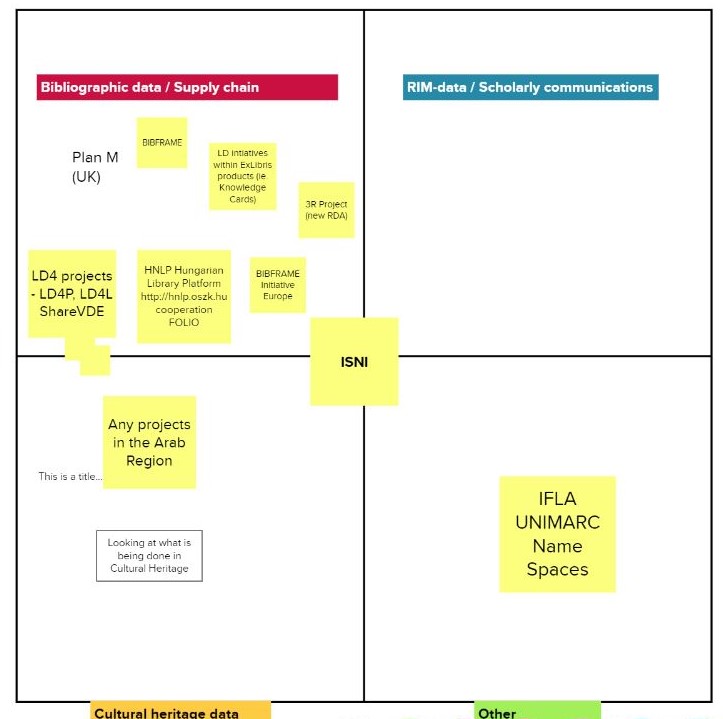As part of the discussion series on Next Generation Metadata, this blog post reports back from the second English language round table discussion held in the afternoon of March 10, 2021.
The session was scheduled to allow a broad audience of participants from a variety of EMEA time zones (Europe, Middle East, and Africa) to attend the discussion, and in the end featured a fascinating diversity of perspectives, with participants from the UK, Ireland, Germany, Hungary, Slovenia, and the United Arab Emirates, from universities, library consortia, and other institutions, with backgrounds in bibliographic control, metadata standards, collection and metadata management or IT.
Mapping exercise
As in all other round table discussions, taking stock of projects in the regions was a first step and resulted in a map mural of projects. Clearly, most projects participants were involved in were centered around bibliographic data and the supply chain.
Given the variety of backgrounds of the participants, it at first seemed that individual and region-specific problems dominated. It was even suggested that this may be a reason why libraries find it harder to effectively join forces in reaching their goals.
However, some common themes also emerged.
Silos are common
Some regions see a lack of standards and platforms to connect data. But even where change is happening, work can be siloed.
If you are inside this thing, you think you are the world, but in this context [of the round table discussion] it becomes clear how small some of those initiatives really are.
And even at the local level, such as on campus, there are lots of silos. E.g., archives and libraries do not always work together, even when it would have been beneficial for a specific project. One participant left the discussion with the intention to find out more about collaboration options. “What is that archive person doing?” There is benefit for all parties concerned in moving beyond the silos and broadening perspectives.
Working with the old while building the new is a challenge
Creating efficiencies for legacy metadata, e.g., by improving the supply chain, was mentioned as highly relevant in more than one region but can feel like a “big enough undertaking” already, although it means still thinking “only” about books and journals, not other materials libraries deal with today. How can innovative work be done on top with the limited resources available to libraries? Can descriptive work be minimized for traditional materials to save time, and if so, what does a minimal record look like? Could researchers themselves help add to the records, and would that be desirable? How is the need to still support MARC21 reconciled with more innovative efforts, like cataloguing natively in Bibframe? Is Bibframe even the right path into the future? Do we need to move beyond that to a graph model that provides even more flexibility in data modelling? Is connecting legacy data with entity based data, as OCLC now plans to do with the Shared Entity Management Infrastructure, an opportunity for leveraging the best of both worlds in this phase of transition?
Education and training of library staff is important
Training in times of transition requires making similar choices. And consistency is key – offering training sessions as one-offs, “spray and pray”, as one participant called it, is not sufficiently effective. Training needs to be an ongoing effort, which can be a challenge in regions without a strong library science background and no specialists available to offer training. And without any IT staff left in the library, some projects become simply overwhelming.
Resistance is real
Cataloguers will not embrace change if they see their roles under threat. And, as one participant put it, “the deeper they are in the [library] science, the more resistant to move” they are. And innovative platforms are left unused if libraries do not see the value in using them. Libraries trained in MARC prefer using MARC – and why not, if it works for them? How can staff be encouraged to embrace change? How can we demonstrate the value of new roles and workflows in libraries, the creativity and freedom that is on offer in resource description, which is so much more than just “linking up”? This is where collaboration with others can really be helpful.
Many participants moved away from the round table with new insights and plans. One of them said:
It made me realize how inward facing we have become over the last year since the pandemic.
Others walked away with plans to develop their teams further for the future, and to have more conversations about the topic with others in their institution, not just the library.
About the OCLC Research Discussion Series on Next Generation Metadata
In March 2021 OCLC Research conducted a discussion series focused on two reports:
The round table discussions were held in different European languages and participants were able share their own experiences, get a better understanding of the topic area, and gain confidence in planning ahead.
The Opening Plenary Session opened the forum for discussion and exploration and introduced the theme and its topics. Summaries of all seven round table discussions are published on the OCLC Research blog, Hanging Together. This post is the third one, preceded by the posts reporting out on the first English session and the Italian session.
The Closing Plenary Session on April 13 will synthesize the different round table discussions. Registration is still open for this webinar: please join us!
Dr. Annette Dortmund led OCLC’s European product management and research concerned with next-generation metadata solutions for libraries and other cultural heritage institutions, with a particular focus on persistent identifiers in scholarly communication and library linked data. She also coordinated and supported European research and engagement programs for the OCLC Research Library Partnership.

